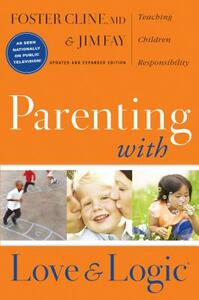Take a photo of a barcode or cover
159 reviews for:
Parenting with Love and Logic: Teaching Children Responsibility
Foster Cline, Jim Fay
159 reviews for:
Parenting with Love and Logic: Teaching Children Responsibility
Foster Cline, Jim Fay
I had to read this book for an education class which really didn't fit. Honestly, I didn't really agree with a lot of the book. Most of my class thought it was stupid and so did I. Some of the examples are borderline mean. I think it is the strangest parenting book I've ever read. I don't know how many, if any, of these principles I would actually use in my classroom or with my children.
I think the ideas in this parenting book are really valuable, but the execution of said ideas will prove extremely difficult. I really need to train myself to think about and react differently to my 3 year-old's behavior. That's the hardest part. I think a 3 year-old's behavior is always going to be challenging, but implementing a couple of the easier techniques has improved things already. It's not so much about disciplining your child as teaching them to be disciplined.
I think this is aimed at parents of older children, or should be, but I like the basics here. Avoiding conflict by putting decisions into your kids' hands when possible and aiming to allow kids to make small-scale mistakes now to help them avoid making larger ones later in life, when they're more independent.
I'm not one for a lot of preachy self-help books. I like to read for entertainment. This book was a gift and it took me almost a year to read because I could only handle it in small doses. That said, there were some valid points I agreed a lot with in this book, about giving our children choices. They recommend giving our children choices in everything (and thus having to deal with the consequences) - from wearing their coats in the winter or not to when to do their chores to paying siblings or parents to do their chores and so on. Some of those were really great ideas. They recommend giving our children safe choices, and yet they actually recommend against making sure our children are properly dressed during cold weather and letting it be their choice. I disagree with that because, I'm sorry, that's not a safe choice, in my opinion.
The book is organized by the first part of the book being about their Love and Logic system (although I didn't think it included enough details on that; it just wasn't in depth enough for me) and then the last part of the book includes 48 "pearls" or situations on how to incorporate their system, which, again, I didn't think was detailed enough for me. However, that said, I think the concept is great and I really need to work more at implementing choices into my parenting style and my children's lives.
Overall, probably 3.5 stars for me.
The book is organized by the first part of the book being about their Love and Logic system (although I didn't think it included enough details on that; it just wasn't in depth enough for me) and then the last part of the book includes 48 "pearls" or situations on how to incorporate their system, which, again, I didn't think was detailed enough for me. However, that said, I think the concept is great and I really need to work more at implementing choices into my parenting style and my children's lives.
Overall, probably 3.5 stars for me.
Loved the ideas and the focus on teaching kids to manage their own items and responsibilities - backing off as a parent. I thought I did a lot of this as a parent...before I started reading the book, and then I realized I still have a long ways to go. One note: The detailed conversations were too stilted. There's no way I could talk to my kids the way the conversations are portrayed, it sounded weird...but I get their ideas. I will probably have to reread this.
The trouble with parenting books is that so many of them are just not applicable to the Terrible Two's. While I agree with SOME of the ideas in this book, I find a lot of their suggestions patronizing and alienating. Eh. The quest for The Two Year Old's Instruction Manual continues...
3.5 Stars
There are some wonderful tips in here, especially for those who agree with the use of logical consequences. Rather than engage in power struggles, say over the child not wanting to wear a coat, this book uses the idea of giving "choices" instead. The child gets to experience decision making, having some control in their life, and the consequences that can follow. I personally feel that this is a great way to learn, especially for minor issues that can come up between parent and child. However, I found some of their examples to be a bit harsh, not age-appropriate, or not realistic (mostly the conversation examples). But, like all parenting books, you take from it what you find useful for your particular situation and disregard the rest.
There are some wonderful tips in here, especially for those who agree with the use of logical consequences. Rather than engage in power struggles, say over the child not wanting to wear a coat, this book uses the idea of giving "choices" instead. The child gets to experience decision making, having some control in their life, and the consequences that can follow. I personally feel that this is a great way to learn, especially for minor issues that can come up between parent and child. However, I found some of their examples to be a bit harsh, not age-appropriate, or not realistic (mostly the conversation examples). But, like all parenting books, you take from it what you find useful for your particular situation and disregard the rest.
I hope these tips will be useful! They seem like very good tips, but I give all parenting books three stars.
I do not want to rate this book because I do not have children yet, and I feel like that's an unfair opinion. I read this book in preparation for becoming a foster parent, and I've just been reading all the parenting books that have been recommended to me, in order to see what style fits best with my husband and I.
I can totally see a lot of situations in this book problematic, especially if I were to use the situations for foster care. I did love the concept of having the child focus on fixing the problem, instead of just relying on punishment, but some of the examples were a bit too strict (for example, I wouldn't be able to let my foster kid go without food, if they didn't like what was cooked for dinner). I can see myself using this more on my future bio kids, with some changes. I love that this book focuses on the children learning responsibility at an early age. I was taught some of the same concepts, and I loved that I was responsible before most of my peers.
All in all, I'm not totally writing this book off - I think its good to read all different parenting styles, and pluck out the good information to build a style that works for you and your family.
I can totally see a lot of situations in this book problematic, especially if I were to use the situations for foster care. I did love the concept of having the child focus on fixing the problem, instead of just relying on punishment, but some of the examples were a bit too strict (for example, I wouldn't be able to let my foster kid go without food, if they didn't like what was cooked for dinner). I can see myself using this more on my future bio kids, with some changes. I love that this book focuses on the children learning responsibility at an early age. I was taught some of the same concepts, and I loved that I was responsible before most of my peers.
All in all, I'm not totally writing this book off - I think its good to read all different parenting styles, and pluck out the good information to build a style that works for you and your family.
3.5 to 4. There were some wise and useful strategies here, but I found a lot of the application examples harsh or unappealing. Still there was a lot of content that I’d adapt and use, so definitely worth the read.



